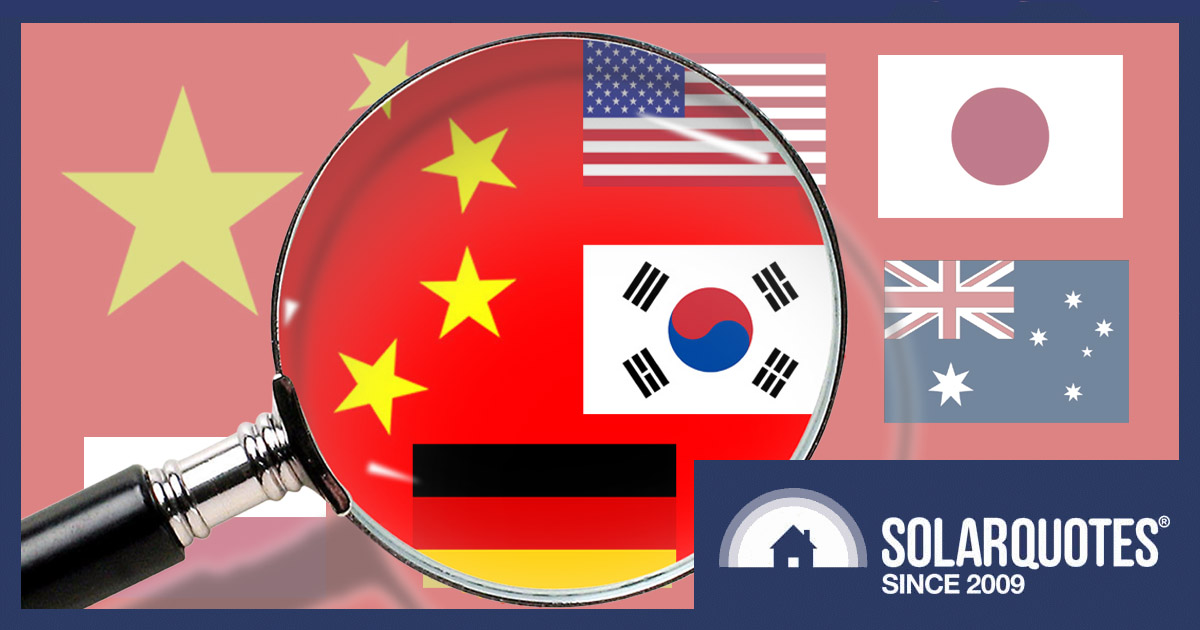
Is ‘Made in China’ a deal-breaker for you when it comes to solar batteries?
You’re not alone. Judging by the support tickets coming into SolarQuotes, a growing number of Aussies want to dodge Chinese-made batteries, and it’s not just about quality anymore—it’s about national security and geopolitics.
So, is this caution warranted? Let’s unpack the reasons behind the distrust, the risks tied to high-tech connectivity, and the alternative options that won’t bear a ‘Made in China’ stamp.
The Rationality of Avoiding Chinese Batteries
What’s fuelling the Aussie reluctance to go for Chinese batteries? Let’s dive into the nitty-gritty.
Manufacturing Practices And Quality Control
China is a global manufacturing powerhouse, making vast quantities of products at competitive prices. Some battery buyers are worried that Chinese manufacturers might prioritise speed and cost-efficiency over attention to detail.
Six of the world’s ten largest lithium-ion battery companies are in China. They produced a whopping 79 percent of all lithium-ion batteries that entered the global market in 2021 and are projected to remain the leading country in lithium-ion battery manufacturing in 2025.
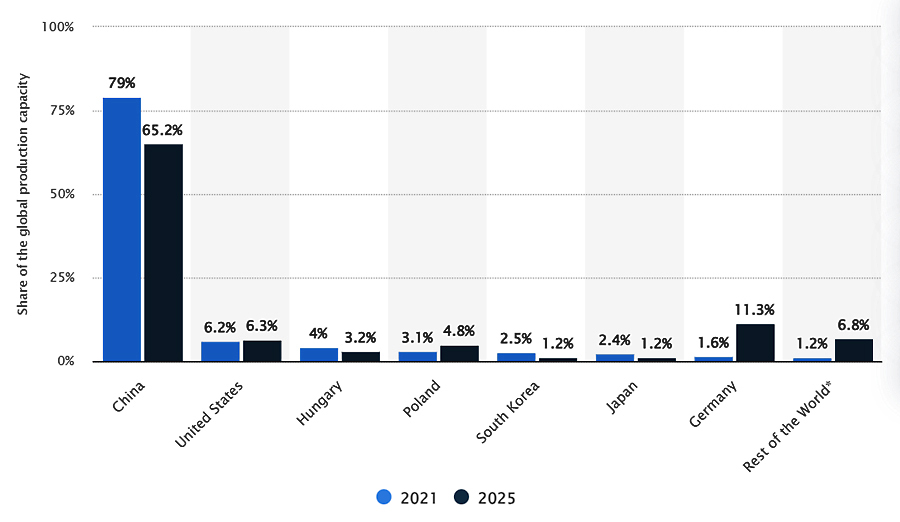
Share of the global lithium-ion battery manufacturing capacity in 2021 with a forecast for 2025, by country. Image: Statista
Many folks prefer to play it safe by choosing batteries from countries perceived to have top-notch manufacturing and strict quality checks—think Germany. But let’s be clear: problems aren’t unique to Chinese products.
Cultural Stigma
In Australia, perceptions related to cultural backgrounds have occasionally cast shadows on products and manufacturing. Such perceptions, often influenced by specific political persuasions, have led to concerns associated with products from certain regions. This broader context has contributed to the scrutiny faced by Chinese-made solar batteries, which goes beyond product quality.
Geopolitical Factors
Cultural stereotypes sometimes taint our view of products and their origins. Often shaped by political leanings, these views create extra suspicion around goods from particular regions. This adds another layer to Aussies’ scepticism towards Chinese solar batteries—it’s not just about the build quality.
Connectivity Concerns
Some Chinese1 batteries can be monitored and managed from the manufacturer’s headquarters. This level of control can raise concerns about data privacy and external influence over the battery’s functionality.
Cyber Security
The convenience of connectivity comes with its own set of security risks. In light of the wave of cybersecurity breaches Australia has seen, it’s no wonder people are concerned. Hackers aren’t just bored kids or criminal organizations. State actors can also exploit software, network, or device vulnerabilities to gain unauthorised access. Although this threat could come from anywhere, many Australians view China as a high cybersecurity risk.
Until now, no cybersecurity attacks have been reported on DERs (distributed energy resources) in any country. That’s not to say it won’t happen. Traditional energy resources, including power grids, have been successfully attacked and shut down in the past.
In 2015 and 2016, Ukraine experienced two separate cyberattacks that caused power outages. The attackers used malware to access the power distribution systems and remotely manipulate circuit breakers, leading to widespread blackouts.
In Australia, the Conti ransomware group targeted the corporate ICT network of Queensland Government-owned electricity generator CS Energy in November 2021. CS Energy became aware of a ransomware incident and immediately severed the external internet connection to its corporate network. Energy supplies were not affected.
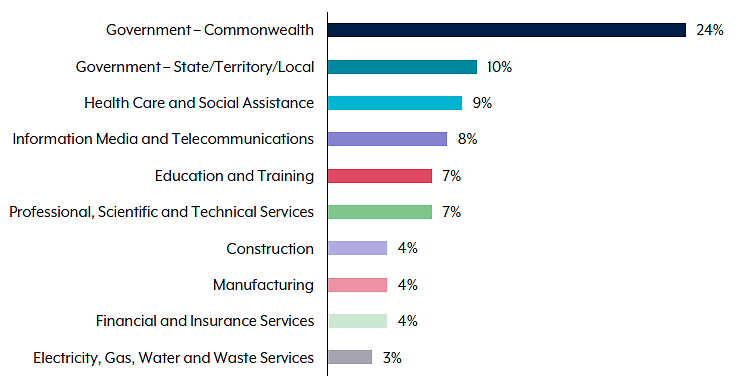
The energy sector rated low for cyber security incidents to which the ACSC responded in financial year 2021–22. Image: Australian Cyber Security Centre
Mitigating Risk
If you think that owning a Chinese-made solar battery system is a risky proposition, there are several things you could do to mitigate any perceived risk.
Don’t Buy One
Firstly, stating the obvious, although China produces the lion’s share, there are many other options, including Australian-made. I’ll leave a list further on in the article.
Research and Due Diligence
If you’re concerned about manufacturing standards and quality control, not all Chinese products suffer from quality issues, and many Chinese manufacturers adhere to high production standards. When researching different battery manufacturers, including Chinese ones, look for brands with a track record of quality, good customer reviews and those recommended by expert installers with a long history of using Chinese brands.
Disconnect From The Internet
You have a Chinese-made battery system, but you’re more worried about cybersecurity than quality issues? Simply disconnect from the internet. Your battery will still function, albeit probably not as well. By isolating your system from online connectivity, you reduce the potential for cyber threats. However, there are significant trade-offs.
Limited Monitoring: Being offline means sacrificing the convenience of remote monitoring and control. Also, some features may rely on internet connectivity.
Delayed Updates: Internet disconnection could prevent you from receiving important software updates that might enhance the performance and, ironically, the security of your battery system.
Troubleshooting: Manufacturers often use internet connectivity to remotely diagnose issues and provide technical support.
Warranty Validity: Some manufacturers stipulate that the system must be connected to the internet to maintain warranty coverage.
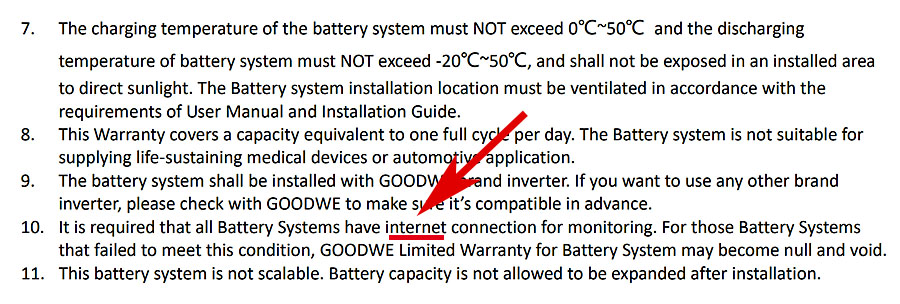
Goodwe warranty preconditions. No. 10 states – It is required that all battery systems have an internet connection for monitoring. For those battery systems that failed to meet this condition. GOODWE Limited Warranty for battery system may become null and void. Image: Goodwe
Secure Your Local Network
So, if you’ve accepted that internet connectivity is part and parcel of owning a modern device, you can do some simple things to secure your local network. These include setting strong passwords, two-factor authentication, and configuring your router’s firewall. Here’s an article that goes deeper into this topic – How To Protect Your Solar Inverter From Hackers.
Manufacturer’s Security Guidelines
It’s in the manufacturer’s interest to keep your battery secure from malicious cyber attacks. They quite often have a document that addresses best practices for cybersecurity. In addition to securing your local network, some systems can be physically locked to prevent access locally or remotely. If the technical jargon to set this up is too much for the average Joe, your installer would gladly help.
Yes, even Chinese companies are being proactive when it comes to security. In May 2021, a Chinese inverter and battery company, Sungrow, became the first company in the renewable energy industry to gain IEC 62443-4-1 CB certification. IEC 62443 is an international series of standards that address cybersecurity for operational technology in automation and control systems.
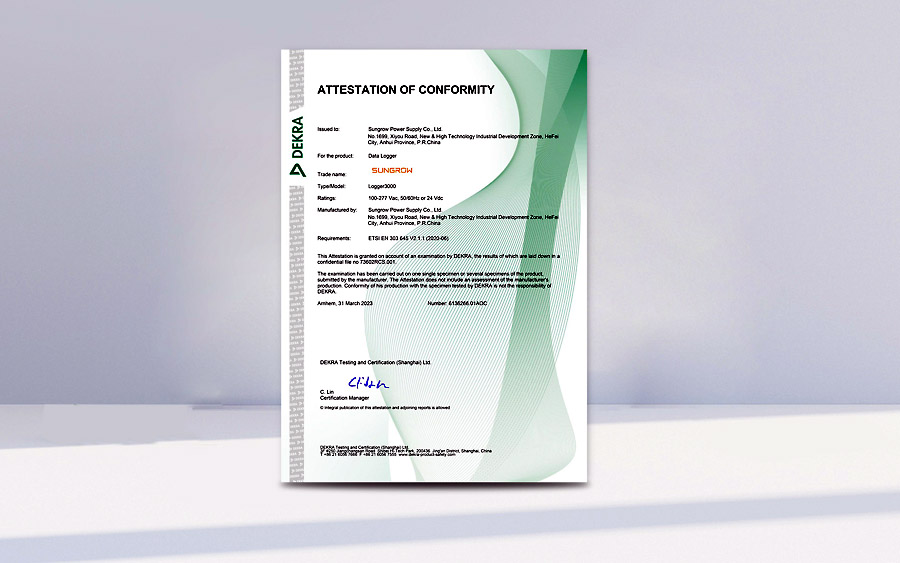
Sungrow IEC 62443 certification promo pic. Image: Sungrow
The Powers That Be Have Our Backs
That’s not a typo! Our friends in Canberra are very worried and doing their utmost to keep our energy assets safe from cyber attacks. The Australian Energy Sector Cyber Security Framework (AESCSF) program assesses cyber security across Australia’s energy sector, particularly critical infrastructure. In 2021, the program was extended to Australian Energy Market Operator (AEMO) electricity grids and markets.
Renewable energy assets such as home rooftop solar/batteries are not considered ‘critical infrastructure assets’ under the Security of Critical Infrastructure Act 2018 (SoCI Act). On the flip side, owners of these small systems don’t have to comply with the onerous regulations set by the legislation. This is an evolving space that is being scrutinized very carefully by stakeholders.
Of course, China-baiting is a predictable go-to used by pollies to strike fear into the heart of any undecided voter. Lately, there’s been a lot of hot air on this subject. The reality is that it’s not just Chinese products that have been vulnerable to hackers.
Which Batteries Are Vulnerable?
The ‘Internet of Things’ (IoT) is a term used to describe the interconnection via the internet of computing devices embedded in everyday objects, enabling them to send and receive data. Any connected device embedded in the IoT, including a solar battery, is a potential target for malicious software or other type of attack.
There is no reason to believe that a solar battery made in China is any more vulnerable to a cyber security breach than one made in the USA, or anywhere else. What’s important is that the manufacturer has addressed any potential security flaws or loopholes.

Our collective devices, known as the IoT (Internet of Things) brings us convenience at the price of cyber vulnerability. Image: Data Science
Solar Batteries Not Made In China
But just in case you’re not convinced and would prefer to have a ripper beaut Aussie-made, or precision German, Korean, or whatever; here’s a list of non-Chinese solar batteries extracted from SolarQuotes’ Solar Battery Comparison Table. All batteries listed have specifications, prices, and links to more information, including customer reviews. Knock yourself out:
| Battery | Company HQ | Made In |
|---|---|---|
| Energizer Homepower | USA | USA |
| Enphase IQ Battery 5P | USA | USA |
| FIMER PowerX | Italy | Italy |
| GenZ 48V 3kWh | Australia | Australia |
| LG Chem RESU | South Korea | South Korea |
| PowerPlus Energy LiFe Series | Australia | Australia |
| Sonnenschein PRO Series | Germany | Germany |
| Zenaji Aeon | Australia | Australia |
| Delta BX | Taiwan | Taiwan |
| Redback Smart Battery | Australia | China |
| Sonnenbatterie | Germany | Australia |
| Tesla Powerwall 2 | USA | USA |
| Eguana Evolve | Canada | Canada |
| Opal Storage | Australia | South Korea |
| QCells Q.HOME CORE | South Korea | South Korea |
| RedEarth Sunrise | Australia | Australia |
| Senec.HOME V3 Hybrid | Germany | South Korea |
| Sunpower Reserve | USA | China |
| VARTA Pulse 6 | Germany | Germany |
Are They REALLY Not Made In China?
Ever heard of vertical integration? It’s when a company owns its whole supply chain. But not all battery makers do this. So, even if a battery is designed and put together in one country, it might still have parts from China. Yep, even the Aussie brands. Check out the table above for more info.
If you’re really that averse to Chinese-made batteries, or any other products for that matter, it will take more than a brief Google search to trace the company’s supply chain. Good luck.
It’s Your Call: China or Not?
The decision to avoid Chinese batteries is a personal one. You may have already made that choice, or perhaps you’re sitting on the fence; in this case, you could take some middle ground by trying to mitigate any perceived risks. Good luck!
Footnotes
- However, the same applies to Tesla Powerwall. ↩

 RSS - Posts
RSS - Posts



A well reasoned and sensible article – thanks Kim!
I’d add that China long ago settled on the safest current battery chemistry (LFP, M3P), which they use in pretty much all their EVs as well as home batteries. The rest of the world still uses alternatives (NMC, NCA) voting for performance and capacity over safety. As a result you may well find yourself deciding between safety and cybersecurity – good luck!
Totally agree with your comment about LiFePO battery safety. We own three LiFePO batteries and they all nicely charge to 100% not 80% and do not shorten battery life like other rechargeable chemistries.
We have a had Tesla model 3 MIC for 2yrs and it performs well and it is handy to charge to 100% not 80% like other EVs. We have a Enerdrive 200AH 12V LiFePO battery in our caravan hooked up to 240V since 2016 and it is still working well.
Most relevant we have a 10kW BYD house battery which has performed very well since 2017 and still going strong if it ever needed replacement would probably be another BYD our battery inverter is a Selectronics and works well in normal operation and very well in blackouts.
We are fans of LiFePO technology and the Chinese certainly know how to make good value reliable batteries. Ideally BYD or CATL or both should set up a battery factory in Australia and we could value add to all those ground up rocks we export.
Quality & security are not the only concerns. Exploitative labour practices and abuse of minorities are also an issue. The Chinese government have shown themselves willing to use trade as a political weapon (barley, wine, coal, lobsters) making maintenance and spare parts of chinese products subject to political whims.
Couldn’t agree more. China has an abominable human rights record, and buying from it supports that. Unfortunately it’s not easy to find alternatives (Finn’s exercise is good), especially with so many EVs coming from China.
Hi John, Finn’s exercise is great. Personally, i don’t trust much coming out of China. Especially anything that is internet enabled or has any external connectivity. I’m ok with them making my toaster, but not much beyond that.
What concerns me – is what happens if there is a sudden “glitch” for want of a better word, with the internet? It’s all really very fragile – and we have a very
unstable situation in Russia (which could easily spread).
The Internet is one of the most robust pieces of infrastructure we’ve ever invented! If there’s a way, however fast or slow, to get a message from one piece of software to another then it’ll get there. There are so many links between countries it’s almost impossible to stop. Starlink has made that even more bomb proof than before which is why the Chinese and Russians in particular are freaked out by it.
The basis of the Internet is a communications protocol that was literally designed to keep working when parts of the network had been destroyed by a nuclear attack on the U.S.
Some sites keep operating normally despite millions of automated hacking attempts per second..
It’s really not fragile at all,, especially if the things connected are properly configured.
No No No…
Hi Hugh, I 100% agree with you. Sure it’s probably stable if an accident happens somewhere, but what if it’s actively attacked. We know China has attempted major Cyber attacks in Australia. And now with every other house having a Chinese made solar inverter strapped to it, we’ve given them the perfect backdoor for a massive cyber attack on our Powergrid.
I really considered getting one of the cheaper Chinese made batteries a few months ago until I did my own research. I came to many of the same conclusions (all be it without the fancy graphs and data). Ultimately, I went with a European made battery and feel a lot safer for it.
Hi Terry
In 2012 I installed 8 x Schott 190W panels. Within 6 months, their panel facility went out of business! The attached (copied from the text above) makes a nonsense of that:
QUOTE Many folks prefer to play it safe by choosing batteries from countries perceived to have top-notch manufacturing and strict quality checks—think Germany. UNQUOTE
Two years ago I installed 24 x Jinko 290W panels which have performed flawlessly
I am very concerned about this FEARFULNESS of China, our largest trading partner.
Zenaji: Lithium Titanate battery that to my knowledge can never catch fire. last for 20000+ cycles, & not connected to the internet! Add Australian made.
To my mind, worth the premium price.
How many installers are installing these batteries, and also are they in the approve list of state-wide rebate programs (e.g. Solar Victoria)?
I am very wary of China’s geopolitical ambitions. And I have worked in cyber security. But I’m happy to use the solar generated by my Chinese panels through my Chinese inverters to power my house and top up my Chinese house battery and my Chinese EV. All my systems have proven reliable.
The reality is that many brands of many systems that don’t appear to be Chinese are made in China or have Chinese components (e.g. Tesla). China leads the world on LFP battery technology and is a manufacturing power house for all things solar. I can’t afford to let my geopolitical concerns override value for money and appropriate (or better) quality
Hi Paul, i’ve been ranting about this risk for aged, i heard about it from some pretty informed people but good to see a cyber security expert is also concerned.
The issue/risk with Chinese made internet connected equipment is about the Chinese government having backdoor relays hidden in the equipment. This issue mostly relates to the Government owned companies and has been detected in brands such as Hikvision and its many rebadges.
Backdoor relays allow spying on networks thru the use of P2P networking that bypasses all firewalls. Since every device has a unique ID, it is easy for them to locate their equipment and then use it to relay into the local network.
I have logged this interaction first hand a number of years ago on several HikVision camera systems.
I am not sure which Battery companies have Government ownership, but they would be the ones to be wary of.
Hi Tony, have you really logged one of these attacks. They’re so frightening. To think that the Chinese Communist Party could be hacking my home terrifies me.
I find some of these comments absolutely amazing! Quality wise I reckon made in China can compete with anyone they wish. It’s all a matter of price but they can produce to as high a standard or as low as one is willing to pay.
Regarding geopolitics
Are people still believing the US system is better, abuses less people, is less exploitative? Or the Israelis? Or just about anyone? I am German by birth and now live in Australia and find the Australiens fear of anything Asian or more particular chinese absolutely irrational and based on right wing, conservative politcal thinking rather than reality.
I’d rather buy chinese than US or Israeli if given the choice and being able to save money along the way. I am also prepared to pay a little extra for European made
Last I checked the Americans and Israelis didn’t use slave labour or have concentration camps er I mean re-education camps for minorities and disfavoured citizens. Nor do they officially poison their own citizens with waste lakes etc – yes some might quibble given the treatment of East Palestine, OH.
As regards ‘fear of Chinese’ that’s partially a problem of the English language. Does Chinese mean Han majority nations, Chinese language speaking nations, or does it exclusively mean Communist China? Taiwan and Singapore are both Chinese nations, while Han Chinese comprise roughly a quarter of the Malaysian population and a tenth of Thailand’s.
The fact you refer to ‘right wing, conservative political thinking’ implies you’re the opposite side of the spectrum, which is traditionally anti-American and anti-Jewish.
As for made in China being able to compete with anyone they wish, I just had something break that I expected to last a decade – it’s about 2 years old. And there’s a bunch of other things around my place that’ve shown themselves to be bare minimum quality despite officially being made in Australia – the parts appear to have been sourced from China. There’s a reason made in China is known for poor quality. Experience!!!
True there is a history of fearing the Yellow Peril, but you really need to put that into historical context, and some of the notions from then are … quaint now. Some of the concerns raised back then however – poorly paid unskilled labour, are even more valid today, though we no longer have British quality craftsmen competing with them. (RoFL). And businesses see the money saved by selling Chinese products rather than Austrian er I mean Australian, as a way to boost their profit margins, especially if they can sell the same thing to the same customer in a few more years. Perhaps the solar battery market is an exception to this, but it’s still pretty early.
it is true that Chinese products are not uniformly great quality(depending what you are paying and domain expertise), but that applies to any country, although to a lesser degree. In my house hold the most technologically advanced products such as my drone, my high-end robovac and my laptops are by China. Those are China’s specialties, as I would not trust the US or Europeans to make them. On the same mindset I would prefer a mechanical watch made by Swiss over a Chinese one. When it comes to batteries and EVs there’s no question that China does it the best, whether to by direct or companies that uses China’s core tech.
My primary concern with all of these batteries is house fires. And lithium seems to lead the charge.
Till that is sorted and a safe battery is available, I’m simply not interested.
Sadly your opinion seems to be all too common when it is actually factually incorrect. It depends on the chemistry on the cathode. If you opt for LiFePO4 (LFM) batteries then you’re quite safe. If, however you opt for cobalt chemistries (NCM, NCA, etc…) as used by companies like SolarEdge, then you’re not safe. Ironically Chinese batteries are almost all LFM for both houses and cars, making them some of the safest batteries available
Strongly agree with Nigel LiFePO seem very safe have a 200Ah 12V that has done thousands of Kms in our off road caravan (Kedron) bouncing along very corrugated roads like Great Central Road and the Plenty Highway without any problems after 8yrs, also have BYD 10kWh LiFePO house battery for 7 yrs and it is fine.
LiFePO is a very safe battery chemistry the two largest battery manufacturers in the world BYD & CATL both use LiFePO chemistry and also happen to be Chinese.
White entitled Australians are totally racist and search for any reason not to accept that Asia and China in particularly have surpassed them. They lap up to other white run countries bias and sadly have no ability to accept the latest movements. It was exactly the same attitude they had of Japanese products until they to proved their susperiority. China is the master in ev and those who do not take advantage of their cheaper quality products are doomed to be the poor man of Asia. Actually does it matter as we are already a banana republic producing virtually nothing technical that the world wants other than raw minerals and farm produce any school dropout can grow.
So Tesla uses BYD and CATL batteries in their PowerWall, therefore i’d say still Chinese (PRC). I don’t know about the rest but i’d check that before saying they “aren’t Chinese”.
I’m less concerned about hacking per se (I guess any battery could be hacked if online) but more concerned about if eg. the CCP one day demanded that software updates be used to remotely disable batteries as a means of coercion. So I guess the question in choosing a battery (I have Enphase micros) is who controls the battery software?
This would be be great new blog here!